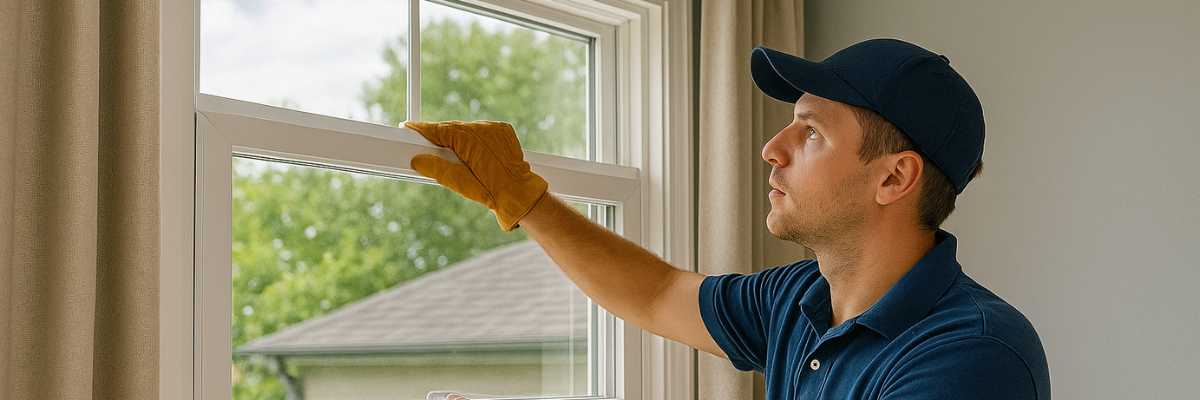Get free quotes within minutes
Easy Tips for Improving Ventilation in Homes

Table Of Content
- Introduction
- Why Ventilation Matters More Today
- The Importance of Ventilation
- Tips for Improving Home Ventilation
- How to Improve Ventilation to Reduce Virus Particles
- Conclusion
It is essential to make sure your home has sufficient air circulation. It improves universal airflow by getting rid of stale air and bringing in clean air. A well-ventilated household lessens the opportunity of viral debris existing there, which in turn lowers the risk of catching COVID-19 and other respiratory ailments. But why is ventilation so important today? People 100 years ago did not have the ventilation systems we have in present-day homes, yet they were as comfortable. But why has it become so important now? Let us explore answers to all of these important questions.
Why Ventilation Matters More Today
In the past, homes used to be much more porous than what we have today. They had small openings such as crevices, apertures, and pores that meant air freely flowed into them. Few houses had insulation in the walls so that fresh air could circulate in and out of the house without restraint. The materials of the buildings, for example, were also different. They include mostly natural products that do not emit chemicals that may affect the atmosphere negatively.
Modern houses are designed and constructed to be more energy-efficient by having minimal gaps. This retains heat or coolness inside but also the pollutants, thus acting as a heat island effect. New furniture, carpets, curtains, paints, and other materials emit gases known as volatile organic compounds (VOCs) and formaldehyde, as well as different chemicals. These can negatively impact the quality of indoor air and, therefore, the need to ventilate.
You may feel the need to know whether any person in your home has contracted COVID-19 or any other respiratory virus. Well, ventilation, along with other precaution measures, minimizes the risks for oneself and other people. Ventilation experts can provide professional advice on how to improve airflow and indoor air quality. Now, let us discuss why it is important to have proper ventilation and how one can achieve this in their house.
The Importance of Ventilation
It is the natural way of getting fresh air right into a room and expelling stale air from a specific vicinity.
Reduces Indoor Pollutants: Air movement reduces the stages of indoor air pollutants, along with dirt, pet dander, and Volatile Organic Compounds. In this manner, you eliminate the pollutant residuals, and by diluting them, you ease up the living environment.
Regulates Temperature and Humidity: Ventilation is crucial in maintaining top-rated temperatures and humilities in homes and other homes. This allows for avoiding the buildup of mildew and mould that usually grows in areas with excessive humidity degrees.
Improves Indoor Air Quality: Ventilation presents a regular stream of sparkling air during the building. This may be very useful in growing the consolation of the residing surroundings, making it even more exceptional to stay in.
Tips for Improving Home Ventilation
You can follow several tips to improve your home's ventilation and air quality.
Open Doors and Windows for Natural Ventilation
Some of the only most convenient measures that may be taken to adorn the drift of fresh air are opening doorways and home windows. This lets fresh air from the outside come in and replace the dirt and stink inside the homes. Natural ventilation is cheap in terms of energy use and assists in the dilution of pollutants within the building.
- Sometimes, one should open the windows and the doors of their houses to allow fresh air to filter through the rooms.
- Open as many doors and windows as possible to act as a way of producing cross ventilation, which increases the flow of air.
- It helps even if you only have the ability to crack a window slightly.
Use Ventilation Systems
There are diverse ways through which you could enhance the flow of clean air in your home, one of which is by installing a nice ventilation device. There are several sorts of systems to don't forget:
Mechanical Extract Ventilation: Expels polluted air from the inside and introduces fresh air from the outside.
Positive Input Ventilation: Brings clean air into the compound and circulates it through the house.
Ventilation with Heat Recovery: Cools down warm air by removing heat and then reheats it to warm fresh air before it is used inside the building.
They circulate and filter fresh air in these spaces, remove undesirable air, and assist in the control of temperatures and relative humidity.
Maintain Your HVAC System
Heating, Ventilation, and Air Conditioning (HVAC) systems are not unusual in most houses, and while maintained, they should be. Proper upkeep of an HVAC system creates fine conditions inside the rooms and saves on energy costs.
Clean and update filters regularly: Clogged filters can re-flow into pollutants and cause a lack of performance in the machine's operation.
Set the fan to “on” as opposed to “auto”: This allows the air to circulate in the rooms even if the heating or cooling isn't on.
Inspect the system annually: Consult and employ the service of an HVAC technician who will examine and fine-tune your system.
Implement Passive Ventilation Strategies
Passive ventilation entails the use of natural air without the employment of any mechanical works.
Cross Ventilation: Ensure that there are windows positioned all over the house to create a good flow of air inside the home.
Passive Stack Ventilation: Takes advantage of hot water rising through the chimney effect to pull out the old air at the upper side of the house to create a circulating airflow.
These methods function with the help of energy beyond what is used within the process, which is both environmentally friendly and economical.
Control Moisture Levels
Humidity is another critical aspect that influences indoor air best because there is a need to make sure that the indoor air is not too moist. This extra moisture causes mildew formation, which is risky for your fitness and unfavourable to your home.
Use exhaust fans: These include fans that should be fitted on the roofs, in the kitchens and bathrooms for optimal air circulation and fast elimination of moisture.
Fix leaks promptly: Any water leakage, whether in the bathroom or even outside it, should be dealt with quickly to avoid the formation of moulds.
Use dehumidifiers: A dehumidifier may be as useful in a locality that experiences high humidity to sustain an ideal level of moisture.
Thus, besides affecting air quality, controlling moisture also enhances the comfort of the living space.
Arrange Furniture Strategically
Interstingly, the formations of your furniture could be affected by the general airflow. Furniture arrangements should be made carefully as they may hinder the movement of air in the room and reduce the efficiency of the available ventilation equipment.
Avoid blocking vents: Do not place furniture over vents to have free air circulation all through the house.
Allow space for air to flow: Plan your furniture layout in such a way as to allow for free movement of air in your living space.
This action can go a long way in helping enhance proper air circulation in the house.
Use Exhaust Fans in High-Moisture Areas
Rooms like the kitchen and the washroom are usually the main culprits of excessive moisture tiers in a household. This moisture can cause the accumulation of mildew and is also associated with decreased indoor air.
Install exhaust enthusiasts: Make sure your kitchen and the bathroom have a ventilating exhaust fan. This is suited for the exterior of your private home.
Run fans during and after use: Leave the fans on during the process of cooking and showering for one hour after that.
Ventilation of these areas is essential in ensuring that the home is free from the presence of bad air.
Consider Using a Portable Air Cleaner
Depending on the scenario in your home, if you do not have a whole home device or if you want to boost the air filtering capacity, a transportable air cleansing device could paint well.
Pick the proper size: Choose a cleaner with a potential that is measured utilising its Clean Air Delivery Rate (CADR), which has the same dimensions as the room.
Look for HEPA filters: The most effective filters are excessive-performance particulate air (HEPA) filters, which generally tend to trap such debris as the ones released while respiration, talking, or maybe coughing.
A transportable air purifier allows for improving the first-rate of air in a room, specifically if the room is tremendously airtight.
How to Improve Ventilation to Reduce Virus Particles
Another measure is to increase the rate of air changes in the house to decrease viral levels in the home. You can lessen how long viruses live in the air by starting windows and doorways, using purified air systems or air purifiers, and turning on fans.
Bring fresh air into your home: Proper air flow involves the holes in doorways and windows to allow clean air from outdoors to flow inside the residence.
Use fans to move air: Take a fan and put it close to a window that can be opened to blow air outside. This is useful in helping to eliminate virus particles in the home. Be careful when using fans, and do not point it to people so that the dirty air will not be blown towards the people.
Turn on exhaust fans: Ensure that your kitchen and bathroom are adequately vented by using fans to discharge air, thereby lessening the density of virus particles in it. Open them after the visitors have left and keep them running for an additional sixty minutes to minimize the accumulation of foul smells.
Filter the air: If your HVAC has a filter, you should adjust the fan to “on” when people are present to keep air circulating. Install pleated filters, which are better types of furnace filters, and replace them every three months.
Limit visitors: The more people that are at home, the more droplets of the virus, hence increasing the chances of its spread—Minimise contact with people only for essential cases and endeavour to make a brief visit.
These methods of ventilation can help minimize the spread of the virus within the home environment.
Conclusion
Ventilation is one of the critical control measures that should be practised in homes to ensure that living conditions are healthy. It minimizes indoor pollution, maintains the desired temperature and relative humidity, and provides a constant supply of fresh air. That is why the following steps should be taken to enhance ventilation in your home and consequently enjoy fresh air.










